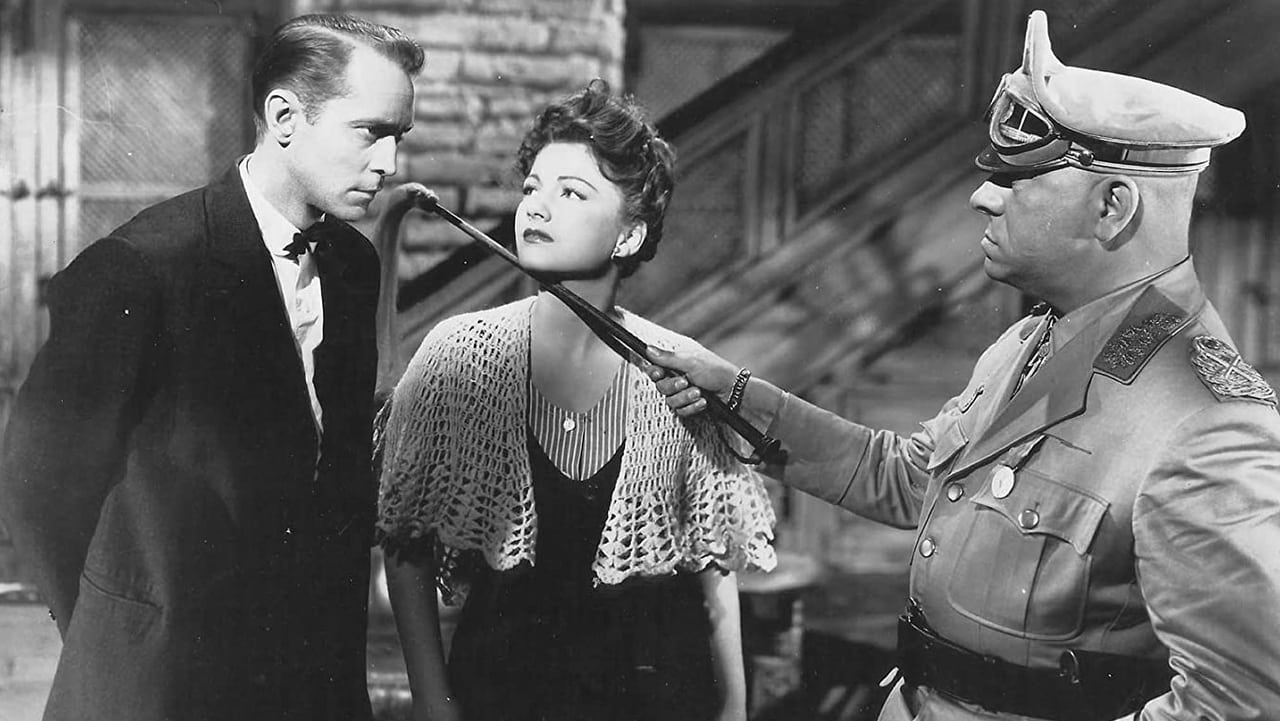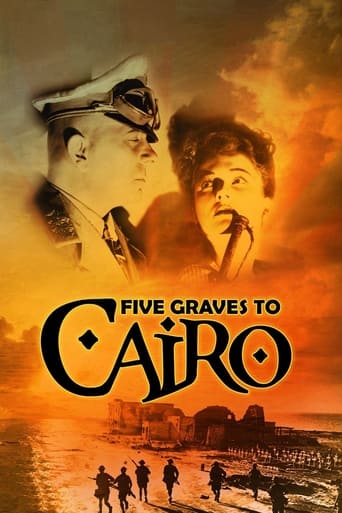

It's remarkable how interesting a war time espionage film can be, while at the same time requiring major suspension of disbelief throughout the story for various reasons. The major one here for me related to the character of actor Franchot Tone impersonating a German undercover spy. Throughout the entire film, not one German officer or soldier thought it appropriate to address him in the mother tongue. There were plenty of opportunities, as German was used sporadically in the story at various times. At least in the interest of being cautious with captured British officers around, one would think Field Marshal Rommel (Erich von Stroheim) or Lieutenant Schwengler (Peter van Eyck) might have addressed Bramble/Davos in German, especially in the early going when all the characters at the Hotel Empress would have come under suspicion.Which brings me to my next point. You probably wouldn't need to know a thing about General Rommel to question why he would speak freely of German military strategy in the presence of English officers. I don't think so. As for the casting of Erich von Stroheim as Rommel, there was no physical resemblance to speak of. My idea for the role would have been someone like Conrad Veidt who portrayed Major Strasser in the Bogart film "Casablanca". Although with the timing of this picture, shooting schedules might have overlapped between the two.One more thing before I'm through. I thought the gimmick with the map and the letters spelling out 'EGYPT' was a fairly clever plot element, but there again, a bit of thought brings a big question mark. Given that any of the letters on the map might have represented an area covering hundreds of square miles, the resolution for the Allies wouldn't have been as precise as the story suggests. Even given a general area in which to unearth the hidden military supplies, a fair amount of time would have been needed to discover a weapons cache.Still, even with all the perceived glitches in the story, I fond the story intriguing enough to hold my attention. All the principals did a good job, and I particularly liked the character of Farid (Akim Tamiroff), who was downright hilarious at times under stressful circumstances. I was also moved by Bramble's response to the Alsatian maid Mouche (Anne Baxter), who had an overbearing concern for her younger brother who was a prisoner of the Nazis. It appeared Bramble made his point when he stated - "It's not one brother that matters. It's a million brothers".
... View MoreThis Early Billy Wilder Film (His second) is as Good as it is because Wilder and His Co-Writer, Charles Brackett, had Control of the Project. It's an Off-Beat, Propagandized War Movie with Strong Writing, Good Performances, and a Low-Key Lighting Atmosphere of Suspense and Intrigue.Heavily Scripted (Oscar Nomination for Adapted Screenplay), Witty, sometimes Humorous (although the Over-the-Top Caricatures are irritating and the worst part of the Movie). It's the Dialog that is Funny and Not the Buffoons Akim Tamiroff and Fortunio Bonanova. Anne Baxter is Solemn and Serious, and Franchot Tone is Serviceable but Unremarkable. It is Erich Von Stroheim that Steals the Show along with the Wilder and Brackett Screenplay. The Movie is Heavily Plotted for Maximum Enticement and Includes Cinematography that is just Right for the Setting.Pay Attention to the Dialog because that is where the Gems can be found. Some of it is Profound and some of it has an Underlying Brutality. Overall, Forgiven the sometimes Overly Patriotic and Propaganda Musings, the Film is Worth a Watch for Wilder, Brackett, and Stroheim. Slightly Overrated, but it is Certainly Different in a lot of respects and that makes it Slightly Special.
... View MoreA really poor view of the events in North Africa during this time is presented in true Hollywood irrelevance. Rommel, of course was nothing like this portrayal given from Von Stroheim. The desert war was a remarkably clean one, given the period and executing hotel maids was not really one of Rommel's personal involvements at any given stage. The ludicrous plot centralizing on Tones spy role is more comedy than reality. Its a low score here for me as given the time, it would have been better to have portrayed some sense of fact than fiction. Flag waving manure as are so many for this period but this seems to be one that could have graduated above the rest. Had the effort been made. It failed.Avoid.
... View MoreDecent WWII thriller. Franchot Tone stars as the only survivor of a tank in Egypt. He barely makes it out of the desert alive, crawling to a former British hotel run by Akim Tamiroff and French maid Anne Baxter. Soon after Tone arrives, the Nazis show up, led by Erich von Stroheim, playing Field Marshall Erwin Rommel. Rommel mistakes Tone for a spy (a waiter who died during an earlier air raid), and he goes along with it. Okay, the plot here is kind of stupid. I think the Nazis are a bit too smart to blindly accept this guy as one of their spies. They don't question him at all. Not on his accent (he's supposed to be Alcase; of course, Tone is supposed to be British and doesn't even attempt a British accent, so, well, whatever), there's no code to prove he is who he claims to be, etc., etc. It's just moronic. Plus, it's established that the dead waiter/spy is still in the bomb shelter, which inevitably leads to a sequence where a Nazi discovers him. You'd think Tone would have thought of that earlier. Tone is a pretty dull actor, Tamiroff is kind of annoying and von Stroheim is a tad too on-the-nose for his role. Baxter is, in fact, the big reason to see the film. She's great, and her role is actually very well written (she's not entirely on Tone's side of the argument, and is frequently thinking about capitulating to the Nazis so they might save her brother from a concentration camp; this is probably an allegory for the occupied France of the time). It's pretty entertaining in spite of its flaws.
... View More